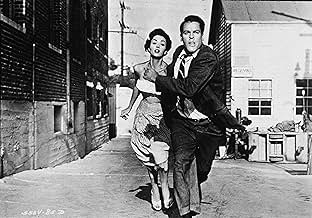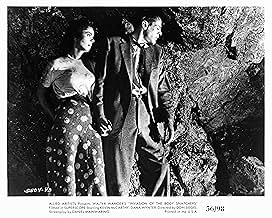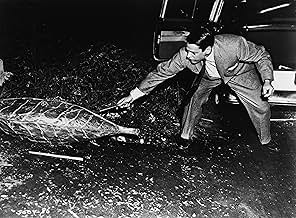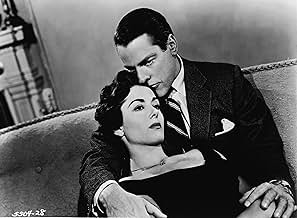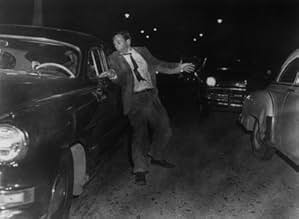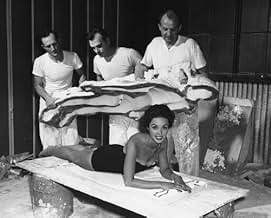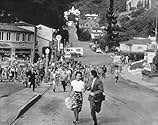IMDb-BEWERTUNG
7,7/10
57.926
IHRE BEWERTUNG
Ein Landarzt erfährt, dass die Bevölkerung seiner Gemeinde durch emotionslose Alien-Duplikate ersetzt wird.Ein Landarzt erfährt, dass die Bevölkerung seiner Gemeinde durch emotionslose Alien-Duplikate ersetzt wird.Ein Landarzt erfährt, dass die Bevölkerung seiner Gemeinde durch emotionslose Alien-Duplikate ersetzt wird.
- Regie
- Drehbuch
- Hauptbesetzung
- Auszeichnungen
- 3 wins total
Empfohlene Bewertungen
'Invasion Of The Body Snatcher's is my favourite 1950s science fiction movie alongside 'Forbidden Planet'. Both are very different movies. 'Forbidden Planet' is arguably the first SF blockbuster, an intergalactic adventure, in colour, with a large budget and impressive special effects. 'Invasion Of The Body Snatcher's is a smaller movie, a low budget black and white paranoid thriller that is a classic of its type. Many subsequent movies have been influenced by this one, and there have been at least two remakes (Philip Kaufman, Abel Ferrara), but it still takes some beating! Director Don Siegel is best known for tough guy crime dramas like 'The Killers' and 'Dirty Harry', but shows his versatility with this extremely effective and disturbing horror story. The legendary Sam Peckinpah had an uncredited hand in the script, and (keep an eye open for) a small cameo as a meter reader. Kevin McCarthy is terrific as the small town doctor turned hero. His performance is excellent, and made him a legend to SF and horror fans everywhere (he reprises it briefly in Kaufman's excellent 1970s remake by the way). The lovely Dana Wynter leads a strong supporting cast, and buffs will get a particular kick out of seeing Carolyn Jones (a.k.a. Morticia Addams) and Whit Bissell. ('I Was A Teenage Werewolf', 'Creature From The Black Lagoon' and too many others to mention!) This movie has aged very well, much better than say, 'The Thing From Another World', and still stands as THE 1950s paranoid SF/horror movie. An absolute classic that I guarantee still packs a punch! Highly recommended!
Body Snatchers is a true anomaly in the cinematic world. It has been remade twice, and all three films are essentially adaptations of a novel by Jack Finney. And despite the often terrible nature of remakes, both the 1978 AND 1993 versions are considered to be just as good as this one. I am looking back at these films in light of the 4th Body Snatchers that is coming out this summer with Nicole Kidman (The Hours) and Daniel Craig (Casino Royale).
Invasion of the body snatchers is generally considered a political film as well as sci fi. It is a reflection of the McCarthy area (recently shown in Good Night, and Good Luck), and cold-war hysteria.
Kevin McCarthy (Death of a Salesman) and Dana Wynter were great and there was good chemistry between them.
The film did not need special effects or gore. It built up it's terror with slow suspense, a sense of impending doom, and an atmosphere that was enhanced by the superb musical score.
This is definitive sci fi and one of the best movies of the 50's.
Invasion of the body snatchers is generally considered a political film as well as sci fi. It is a reflection of the McCarthy area (recently shown in Good Night, and Good Luck), and cold-war hysteria.
Kevin McCarthy (Death of a Salesman) and Dana Wynter were great and there was good chemistry between them.
The film did not need special effects or gore. It built up it's terror with slow suspense, a sense of impending doom, and an atmosphere that was enhanced by the superb musical score.
This is definitive sci fi and one of the best movies of the 50's.
Invasion of the Body Snatchers, suggested an "individual's unimportance in a complex, modern world."
In the 1950s, The American cinema produced a sequence of science fiction films that generally revolved around and reflected significant political, cultural and social concerning plots. These films presented incredible events that usually were the result of nuclear radiation, alien invasions, mutation, and body snatching influences. In addition to the film plots, special effects were added to complete the cinematic experience. The film, Invasion of the Body Snatchers, suggested an "individual's unimportance in a complex, modern world." Beneath the unimportance was the political concern of conformity and loss of individuality among the residents of Santa Mira, California. Invasion of the Body Snatchers illustrates the difference between America's collision of Individualism and the collective culture of conformity. Although Invasion of the Body Snatchers did not intend to become an allegory of political work according to director Don Siegel, it is evident that through specific instances, the film became a symbolic contrast of individualism and collectivism.
The office scene between protagonist, Miles Bennell played by Kevin McCarthy and former girlfriend Becky Driscoll played by Dana Wynter occurs as they are escaping the pod people, launching the chase sequence. As Miles and Becky hide themselves in a doctor's office, Miles goes into a moralistic speech about the pod people. In this instance, the pod ideology is revealed and ultimate goal of conformity is discovered; to convert the residents of Santa Mira for a collective, classless, Communist-like society as well as to promote the purpose to suppress individuality, to make life easier. In reality, this scene is a symbolic parallel to Senator Joseph McCarthy's pursuit for social conformity in the 1950s. This scene is packed with conspiracy and paranoia. Also, metaphorical of McCarthy's claims that there were Soviet spies and Communists inside the government system and among the general population.
While Miles and Becky hide in the doctor's office, they an abundance of take pills to stay awake. Sleep stands as an allegory to suggest the burgeoning of a mass conformity; where the pods take over the residents while they fail to be alert, meaning sleeping. In the film, it is said that, "the pods will absorb your minds, your memories, and you're reborn into an untroubled world". This untroubled world represents the world of classless, ambition-less, emotionless, simple society, where every individual is no longer "individual", rather, a hollow drone of a collective socialist culture.
As stated earlier, in the 1950s McCarthy made claims of covert Communists inside the government; Invasion of the Body Snatchers also has a covert concept in regard to ignoring what seems to be out of the ordinary. This concept concerns the role of the authorities in the film. Miles is taken in by authorities on the invasion of the pod people, when the psychiatrists and police attempt to turn the bizarreness of the situation into a simple matter, as if it is Miles who is delirious. This scene alludes to authority figures and the effort to encourage normalcy in the most mind-boggling situations. Invasion demonstrates society becoming less individual and more depersonalized with the characterless collective society replacing America.
The office scene between protagonist, Miles Bennell played by Kevin McCarthy and former girlfriend Becky Driscoll played by Dana Wynter occurs as they are escaping the pod people, launching the chase sequence. As Miles and Becky hide themselves in a doctor's office, Miles goes into a moralistic speech about the pod people. In this instance, the pod ideology is revealed and ultimate goal of conformity is discovered; to convert the residents of Santa Mira for a collective, classless, Communist-like society as well as to promote the purpose to suppress individuality, to make life easier. In reality, this scene is a symbolic parallel to Senator Joseph McCarthy's pursuit for social conformity in the 1950s. This scene is packed with conspiracy and paranoia. Also, metaphorical of McCarthy's claims that there were Soviet spies and Communists inside the government system and among the general population.
While Miles and Becky hide in the doctor's office, they an abundance of take pills to stay awake. Sleep stands as an allegory to suggest the burgeoning of a mass conformity; where the pods take over the residents while they fail to be alert, meaning sleeping. In the film, it is said that, "the pods will absorb your minds, your memories, and you're reborn into an untroubled world". This untroubled world represents the world of classless, ambition-less, emotionless, simple society, where every individual is no longer "individual", rather, a hollow drone of a collective socialist culture.
As stated earlier, in the 1950s McCarthy made claims of covert Communists inside the government; Invasion of the Body Snatchers also has a covert concept in regard to ignoring what seems to be out of the ordinary. This concept concerns the role of the authorities in the film. Miles is taken in by authorities on the invasion of the pod people, when the psychiatrists and police attempt to turn the bizarreness of the situation into a simple matter, as if it is Miles who is delirious. This scene alludes to authority figures and the effort to encourage normalcy in the most mind-boggling situations. Invasion demonstrates society becoming less individual and more depersonalized with the characterless collective society replacing America.
Dr. Miles J. Bennell (Kevin McCarthy) is called back to his small California home early from a conference because a number of his patients have been frantically asking to see him. But oddly, when he returns home, most forget about their unspecified needs. At the same time, it seems that a mass hysteria is building where residents believe that friends and loved ones are "not themselves", literally. Just what is going on? As of this writing, it has been more than twenty years since I have seen the 1978 remake of this film, so I can't compare the two at the moment. However, it would have to be flawless to top this, the original Invasion of the Body Snatchers.
The sole factor that caused me to give the film less than a ten was the pacing during portions of the first half hour or so. While it's not bad, exactly, director Don Siegel does not build atmosphere and tension as effectively as he might have while the viewer is being filled in on the necessary exposition. Admittedly, this section is directed in a standard way for its era, but "standard" here is enough to subtract a point.
However, once we reach Miles' friend Jack Belicec (King Donovan) discovering a body on his billiard table, the suspense and tension gradually increase, and the remainder of the film is a very solid ten.
The literal "weapon" of the film's horror could have easily come across as cheesy, but it doesn't. Don Post and Milt Rice's special make-up effects and props are threateningly eerie. The transformation sequences involving the props are beautifully shot and edited--showing just enough to make them effective, but not so much that the mystery is gone.
It was ingenious to create a story where a whole town gradually turns into a villain, and even natural, unavoidable biological functions threaten our heroes' destruction. In conjunction, it all creates an intense sense of claustrophobia and paranoia for the audience.
McCarthy and Dana Wynter, as Miles' girlfriend Becky Driscoll, expertly convey a gradual transformation from common citizens to panic-stricken, desperate victims on the run. The film is also notable for slightly ahead-of-its time portrayals of relationships and divorce.
Much has been said about the parallels between Invasion of the Body Snatchers and the "communist paranoia" in the United States in the late 1940s and early 1950s, especially as it was directed against Hollywood by the House of Un-American Activities Committee. (And how ironic that the star of Invasion of the Body Snatchers is named McCarthy?) However, there is another very interesting subtext present that isn't so often mentioned. The film can also be looked at as a philosophical exploration of personal identity. Just what does it take for people to be themselves? Is it how they look, act, the things they say? Is it not the case that people are constantly transformed into something they weren't just hours ago, or even moments ago? Among the many ways that these kinds of ideas are worked into the script is that sleep is a metaphor for unconscious physical change over time. It would be easy to analyze each scene in the film in this manner, going into detail about the various implications each plot development has on the matter of personal identity.
Despite the slight pacing/atmosphere flaw in the beginning, this is a gem of a film, not just for sci-fi and horror fans, and not just for its era. It's worth seeing by anyone with a serious interest in film, and can be enjoyed either on its suspenseful surface level, or more in-depth by those who want to look at the film as more metaphorical material for societal and philosophical concerns.
The sole factor that caused me to give the film less than a ten was the pacing during portions of the first half hour or so. While it's not bad, exactly, director Don Siegel does not build atmosphere and tension as effectively as he might have while the viewer is being filled in on the necessary exposition. Admittedly, this section is directed in a standard way for its era, but "standard" here is enough to subtract a point.
However, once we reach Miles' friend Jack Belicec (King Donovan) discovering a body on his billiard table, the suspense and tension gradually increase, and the remainder of the film is a very solid ten.
The literal "weapon" of the film's horror could have easily come across as cheesy, but it doesn't. Don Post and Milt Rice's special make-up effects and props are threateningly eerie. The transformation sequences involving the props are beautifully shot and edited--showing just enough to make them effective, but not so much that the mystery is gone.
It was ingenious to create a story where a whole town gradually turns into a villain, and even natural, unavoidable biological functions threaten our heroes' destruction. In conjunction, it all creates an intense sense of claustrophobia and paranoia for the audience.
McCarthy and Dana Wynter, as Miles' girlfriend Becky Driscoll, expertly convey a gradual transformation from common citizens to panic-stricken, desperate victims on the run. The film is also notable for slightly ahead-of-its time portrayals of relationships and divorce.
Much has been said about the parallels between Invasion of the Body Snatchers and the "communist paranoia" in the United States in the late 1940s and early 1950s, especially as it was directed against Hollywood by the House of Un-American Activities Committee. (And how ironic that the star of Invasion of the Body Snatchers is named McCarthy?) However, there is another very interesting subtext present that isn't so often mentioned. The film can also be looked at as a philosophical exploration of personal identity. Just what does it take for people to be themselves? Is it how they look, act, the things they say? Is it not the case that people are constantly transformed into something they weren't just hours ago, or even moments ago? Among the many ways that these kinds of ideas are worked into the script is that sleep is a metaphor for unconscious physical change over time. It would be easy to analyze each scene in the film in this manner, going into detail about the various implications each plot development has on the matter of personal identity.
Despite the slight pacing/atmosphere flaw in the beginning, this is a gem of a film, not just for sci-fi and horror fans, and not just for its era. It's worth seeing by anyone with a serious interest in film, and can be enjoyed either on its suspenseful surface level, or more in-depth by those who want to look at the film as more metaphorical material for societal and philosophical concerns.
A chilling motion picture, well directed by Don Sigel, with a script co-written by Daniel Mainwaring and (uncredited) Sam Peckinpah, based on the novel "The Body Snatchers" (aka "Sleep No More") by Jack Finney.
The excellent musical score is by Carmen Dragon. Kevin McCarthy and Dana Wynter head the cast of this four-star classic in which the inhabitants of a small California town are being replaced by alien look-alikes. The aliens come to Earth in the form of "seed pods" that burst open and spew out a foam which grows into human duplicates, complete with all the memories of the original. The best scene in the film takes place in a greenhouse where several alien pods burst open and disgorge the half-formed copies of the horrified humans.
A prologue, a new ending, and a voice over-narration were added after the film's initial release, to help the audience follow the strange plot. In the added scenes, the story opens with Kevin McCarthy being brought into a hospital, raving about alien invaders. Two doctors (Whit Bissell and Richard Deacon) listen to McCarthy's strange story, which the audience sees as a flashback. At the end of he movie the doctors are understandably skeptical about McCarthy's weird yarn, but an unexpected event lends credence to his story.
Many film reviewers criticize these added scenes as unnecessary, an unwise attempt to conclude the story with a happier ending. But these scenes serve a valuable purpose, increasing the viewers sympathy for McCarthy and his efforts to convince someone that mankind is in danger. The alleged "happier ending" does not establish that mankind will win the battle against the aliens. It simply implies a Chapter Two in this epic struggle. Mankind will have a fighting chance in the war, but the outcome is definitely open to debate.
The excellent musical score is by Carmen Dragon. Kevin McCarthy and Dana Wynter head the cast of this four-star classic in which the inhabitants of a small California town are being replaced by alien look-alikes. The aliens come to Earth in the form of "seed pods" that burst open and spew out a foam which grows into human duplicates, complete with all the memories of the original. The best scene in the film takes place in a greenhouse where several alien pods burst open and disgorge the half-formed copies of the horrified humans.
A prologue, a new ending, and a voice over-narration were added after the film's initial release, to help the audience follow the strange plot. In the added scenes, the story opens with Kevin McCarthy being brought into a hospital, raving about alien invaders. Two doctors (Whit Bissell and Richard Deacon) listen to McCarthy's strange story, which the audience sees as a flashback. At the end of he movie the doctors are understandably skeptical about McCarthy's weird yarn, but an unexpected event lends credence to his story.
Many film reviewers criticize these added scenes as unnecessary, an unwise attempt to conclude the story with a happier ending. But these scenes serve a valuable purpose, increasing the viewers sympathy for McCarthy and his efforts to convince someone that mankind is in danger. The alleged "happier ending" does not establish that mankind will win the battle against the aliens. It simply implies a Chapter Two in this epic struggle. Mankind will have a fighting chance in the war, but the outcome is definitely open to debate.
Wusstest du schon
- WissenswertesProduction designer Ted Haworth came up with a fairly simple and inexpensive (about $30,000 total) idea for creating the pods. The most difficult part was when the pods burst open, revealing the likenesses of the actors. The actors had to have naked impressions of themselves made out of thin, skin-tight latex. Making the casts, which involved being submerged in the very hot casting material with only a straw in their mouths to breathe through, was grueling for the actors, especially Carolyn Jones, who was claustrophobic. Dana Wynter recalled, "I was in this thing while it hardened, and of course it got rather warm! I was breathing through straws or something quite bizarre, and the rest of me was encased, it was like a sarcophagus. The guys who were making it tapped on the back of the thing and said, 'Dana, listen, we won't be long, we're just off for lunch [laughs]!' In the end, we had to be covered except for just the nostrils and I think a little aperture for the mouth."
- Patzer(at around 20 mins) When Dr. Bennell is shown the body on the pool table he never bothers to ask where it came from or why it is there. One would think that would be the first question.
- Zitate
Dr. Miles J. Bennell: They're here already! You're next! You're next, You're next...!
- Crazy CreditsTHE END comes up on the final shot of the film of Miles looking relieved that Dr Hill has believed his story, and is calling the FBI about the alien invasion of Santa Mira.
- Alternative VersionenOriginally released at 80 minutes; reissued in 1979 at 76 minutes, deleting the studio-imposed prologue and epilogue starring Whit Bissel and Richard Deacon.
- VerbindungenEdited into Angriff der Riesenkralle (1957)
Top-Auswahl
Melde dich zum Bewerten an und greife auf die Watchlist für personalisierte Empfehlungen zu.
Details
Box Office
- Budget
- 417.000 $ (geschätzt)
- Weltweiter Bruttoertrag
- 3.717 $
- Laufzeit1 Stunde 20 Minuten
- Farbe
Zu dieser Seite beitragen
Bearbeitung vorschlagen oder fehlenden Inhalt hinzufügen



